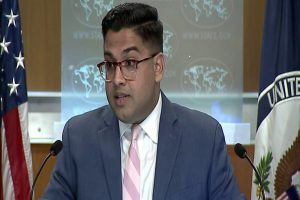Kicking off the Counter-Terrorism Week, UN Secretary-General Antonio Guterres has called on all nations to “stand as one” to fight the scourge.
“When it comes to combatting terrorism, we must stand as one against this global threat,” he said on Monday at the High-Level Conference of Heads of Counter-Terrorism Agencies that is at the core of week-long programmes.
“In the names of all those who have suffered and continue to suffer, and in the names of all victims and survivors, let’s intensify our work to create a future without terrorism.”
At a tree-planting ceremony held to honour the memory of the victims of terrorism, Karambir Singh Kang who survived the 26/11 Mumbai terrorist attacks, said: “I truly believe that with solidarity and unity we are no longer victims and become stronger together to face any adversity.”
His wife and two sons were killed in the attack by Pakistan-based terrorists.
The Group of Friends of Victims of Terrorism, which includes India, and the UN Office of Counter-Terrorism organised the tree-planting.
Guterres said that although there were some “significant gains”, terrorism and violent extremism acecontinue to take root and grow”.
Al Qaeda and the Islamic State terror hroups are continuing to make headway in Africa, while Neo-Nazi and White supremacist movements are emerging as the primary internal security threat in several countries, he said.
The UN chief said that preventing terrorism is not just foiling attacks but it also requires addressing the factors that help its spread.
He listed the as poverty, discrimination, disaffection, weak infrastructure and institutions and gross violations of human rights.
“We must ensure that counter-terrorism strategies and measures reflect all communities, constituencies and voices — especially minorities, women and young people — and do not hinder civil society in carrying out their vital work,” Guterres added.
Meanwhile, General Assembly President Csaba Korosi warned: “If we cannot work together, the terrorists will win. Our collective success requires approaches which are innovative, agile, multi-faceted, and integrated.
“Combatting these threats is an urgent responsibility of the entire international community, because they are challenging the very foundations of the United Nations Charter we have sworn to uphold.”
The Under-Secretary-General for Counter-Terrorism, Vladimir Voronkov, said that “complex dimensions to the threat” have risen from new technologies, the exploitation of cyberspace, and the manipulation of social media platforms.
“The magnitude, complexities and evolving nature of terrorism require a robust and coordinated regional and international response,” he said.












